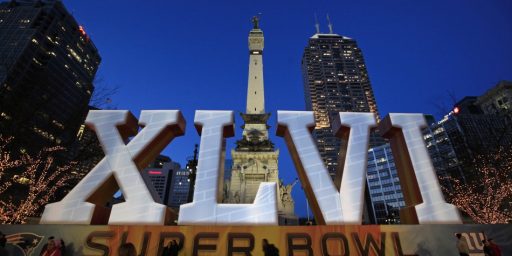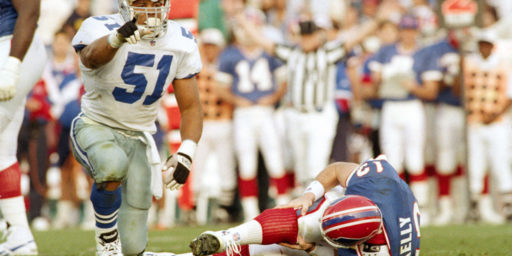White House Bid Could Cost Winner $400 Million in 2008
Thomas B. Edsall and Chris Cillizza front today’s WaPo with a report that the “entry fee” for the 2008 presidential race will be $100 million.
The reason? The “gradual breakdown of the public funding system” that we saw beginning in the last cycle.
President Bush and Democratic nominee John F. Kerry decided then to do without public matching funds in the nominating phase of the campaign — money that came with a requirement to limit spending to just $44.7 million each. They went on to raise $274.7 million and $253 million, respectively, before accepting public funding for the general election campaign in the fall. Their success established what many strategists believe will be a new norm in presidential politics.
What’s more, many analysts believe that 2008 will be a clash of such titanic intensity that the nominees will reject public funding — and the spending limits that govern it — even for the fall campaign. If so, most bets are that each major-party candidate would need to raise in excess of $400 million by the Nov. 4, 2008, election. Candidates would want to raise as much of that money as early as possible, so as not to waste precious campaign time holding fundraisers.
Those amounts are staggering. Still, some perspective is warranted.
A single 30-second ad for this year’s Super Bowl sold for $2.5 million to $2.6 million. So, a successful White House bid would cost the equivalent of 40 of those spots for each Super Bowl during the four years the winner holds the office. And that’s locking in today’s prices!
The Census Bureau estimates the current population of the United States at 298,278,139. That means the winning candidate will have to spend $1.34 to reach every man, woman, and child he will govern.
Given the stakes, the real question seems clear: Why are we doing our politics on the cheap?






Given the stakes, the real question seems clear: Why are we doing our politics on the cheap?
With a point of view like this it is easy to understand why politics in the US (and most everywhere else) is a cesspool of corruption.
I would say, given the stakes, why are politics so completely money driven?
…and the answer is because those with money want it that way.
Rick: But the overwhelming majority of the money, especially on the Republican side, is from small contributions of well under $500. It’s just a function of a lot of people giving money in order to buy advertising, which is expensive.
I don’t believe that’s the question at all, James. The reason that it’s as cheap as it is is that television networks don’t want to charge more for time for fear of regulation. Otherwise they’d charge five, ten times what they’re charging now.
I don�t believe that�s the question at all, James. The reason that it�s as cheap as it is is that television networks don�t want to charge more for time for fear of regulation. Otherwise they�d charge five, ten times what they�re charging now.
This is complete B.S. television networks charge what the market will bear. If they charge too much, they will send advertisers to other – more effective – advertising channels.
And for that matter, TV time is *not* that expensive in terms of cost. Indeed, if you knew how much it actually cost to broadcast a 30-second commercial, I think you’d think the exact opposite.
And it should be noted that most of this advertising is going to be “local” or at least “regional” in flavor. Very little of the advertising actually goes to national ads.
Personally, I think they should go back to some form of free advertising for candidates. Of course, that would cut into some of the incumbent advantage – so it’s never going to happen.
bryan: Actually, public financing–assuming it came with a ban on private spending or some sort of spending cap–would be to the advantage of incumbents. An “equal” playing field in that regard almost assures that the incumbent, who starts with huge name ID and the ability to tout billions in federal pork he’s brough home, wins.
Actually, public financing�assuming it came with a ban on private spending or some sort of spending cap�would be to the advantage of incumbents.
*some* incumbents, James. Imagine if the pork-laden incumbents were not able to rely on their large war chests of pork-influencing campaign funds against lesser challengers. If nothing else, some type of equal time measure would allow people without huge personal fortunes to have a leg to stand on in opposition.
An �equal� playing field in that regard almost assures that the incumbent, who starts with huge name ID and the ability to tout billions in federal pork he�s brough home, wins.
Which would make it no different than the current system.
$400 mil is to keep out the riffraff…don’t want the “regular” folk having a shot at the halls of power.
In all seriousness, being President under our current system requires that you know the big players in some industries…regular folk don’t have that kind of access and experience.
Gee, $1.34 per American for electing a president…what would it cost if the goverment (our taxes) paid for it…and, along the same line…why should my money go to support the canidacy of someone I can’t stand…just because someone thinks “it’s a good idea”
Jonk,
When was the last “regular folk” to get elected president, campaign finance or no? Presidents and other senior officials have almost always come from the upper class, going back to George Washington.
Darn, I was planning on entering the race, but the 400 Million is 399.99999999 $ over my budget.
Oh Well!
LOL! I should have said with “tongue firmly in cheek” about “regular folk”.
But that aside, just because something has always been a certain way does not mean that it is correct.